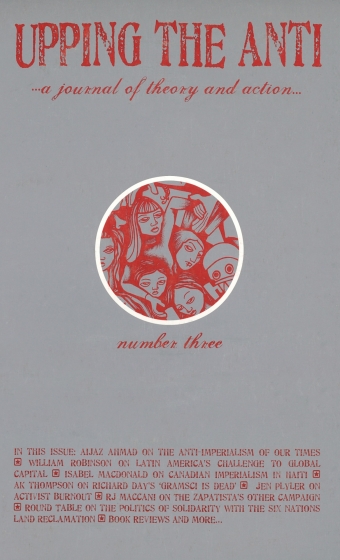Socialism from Below, A Response
Dear Comrades,
I would like to thank both Ray and Sebastian Lamb for responding to my article on the politics of socialism from below in the last issue of Upping the Anti. Ray in particular provides us with some helpful background and context to Draper’s life and times and describes how the question of “from below” and “from above” politics have arisen in a variety of different political and historical circumstances.
Unfortunately, while Sebastian Lamb writes for the purpose of critiquing my article, he never really develops his arguments. I will address a few of the points that he mentions in his letter, not so much for the sake of being argumentative, but rather to clarify what I think Ray, Lamb and myself all see as the crucial question framing the debate over socialism from below – the “crisis in Marxism” and the historic failure of the revolutionary left in North America.
I will start with the last of Lamb’s criticisms. He accuses me of being sectarian because I argue that “cultism, bureaucratization and reformism” have deformed and destroyed virtually every socialist grouping worthy of the name existing today. My observation, which is grounded in the Canadian context but is applicable elsewhere, has nothing to do with some kind of revolutionary purism or sectarianism on my part, but is a simple statement of fact. Despite having recruited (and lost) hundreds of members over the past decade in Canada alone, revolutionary socialist groups claiming to apply one variant or another of “democratic centralism” have consistently failed to build healthy political organizations that can make principled interventions in the struggles of our day.
While a significant aspect of this problem relates to the overall objective conditions of class struggle in Canada and the US, there have been no shortage of opportunities in anti-globalization, anti-war or international solidarity movements within which various socialist organizations could have transformed themselves or made significant contributions to the development of these struggles. Sadly, the opposite has most often been true. In my article, I attribute this fact to the ‘historical failures of the Marxist organizational form,’ and analyze whether or not the politics of “socialism from below,” as developed by Draper and McNally, can form an alternative approach to the problem of “socialism from above” that keeps distorting the Marxist project of liberation.
My article suggests that Draper and McNally’s perspective is incapable of resolving this problem for a number of reasons. Firstly, it deliberately distorts the anarchist contribution to revolutionary thought. Secondly, its framework either ignores or occludes the contribution of revolutionary anti-oppression politics by seeking to incorporate it in an “additive” form. And finally, it is ultimately a simplistic and reductionist approach to forms of struggle that are always simultaneously “from above” and “from below.”
Lamb is right in saying that in developing a revolutionary theory, we need to study “real movements, struggles and social relations past and present.” That is precisely the aim of Upping the Anti and that is why we spend so much time focusing on interviews and roundtables with activists and theorists directly involved in these struggles. However, Lamb seeks to dismiss my arguments by drawing an artificial separation between doing this work and “reading Marx, Bakunin or whoever.” Instead, I would remind him that movements never exist in a political vacuum and are therefore conditioned by their understandings of Marxism, anarchism or whatever other revolutionary ideologies and thinkers.
We therefore have to consider issues of theory and try to distinguish between what is good and still relevant and what must be transcended. This was the main point of my article. We need to rethink the political interaction between Marxism and anarchism, conduct a thorough analysis of oppression and self determination, and develop a methodology capable of understanding the complex processes of revolution and political organization taking place in our world today. If there is a connection between developing revolutionary movements and their understandings of both history and socialist and anarchist ideas, then we owe it to ourselves to undertake this theoretical work seriously. Part of this means addressing the political shortcomings of our past practices and theories.
In the case of the politics of “socialism from below” this has not yet been done. It has certainly not been carried out by the members of the International Socialist Tendency who, despite their bureaucratic maneuvering, reformist alliances, and open sabotage of movements they can’t control, continue to claim the banner of “socialism from below” as their own. Unfortunately, neither has this work been attempted by those, like Lamb, who split from the International Socialist Tendency due to its political degeneration and anti-democratic practices. Hopefully, Lamb and other members of his political group will undertake this work. If so, the pages of this journal are open to their contributions.
Comradely,
Tom Keefer.

